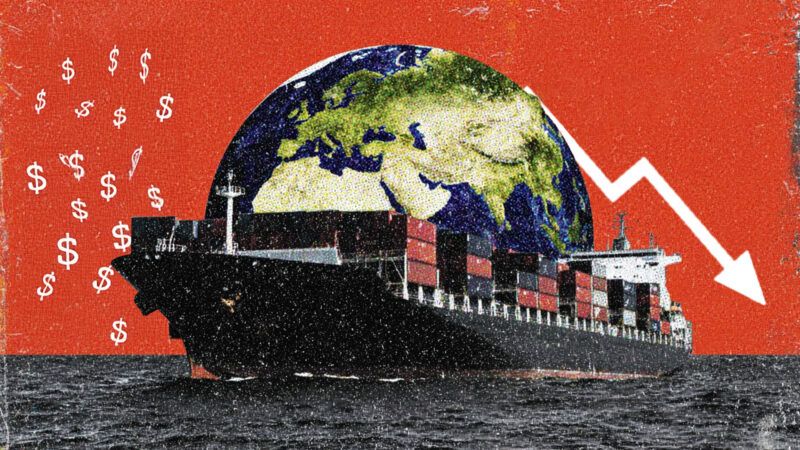This Black Friday, Thank Globalization for Affordable Gifts
Global markets make Black Friday deals and generous holiday gift-giving possible.

When the Christmas season comes around each year, we rack our brains for how best to show our care and consideration for our loved ones. Thankfully, capitalism and globalization have made it easier than ever to get gifts for the special people in our lives.
With Amazon, you can get the remote-controlled helicopter little Johnny's been begging for delivered to him the very next day, and at a far lower price than when you were in the RC market. If you have a lucky lady (or hombre; we appreciate flowers too!) in your life, and a penchant for missing important dates, no worries! You can have imported flowers picked up from the local grocery store and delivered to her doorstep via InstaCart, DoorDash, or Uber Eats. You can even purchase your liberty-loving friends and family a subscription to Reason magazine, which is printed on Finnish paper.
Unfortunately, President Donald Trump and his cronies have recast the gains from trade as losses. On the campaign trail last year, J.D. Vance said that "a million cheap, knockoff toasters aren't worth the price of a single American manufacturing job." Since assuming office, Trump has followed through on his campaign's protectionist rhetoric, increasing the average tariff rate from 2.5 percent to 12.5 percent, a rate not seen since 1940. Trump has admitted that his tariffs will make gifts more expensive: Not only will children "have two dolls instead of 30 dolls" this Christmas, but these dolls will "cost a couple of bucks more than they would normally," he told reporters in April.
With this protectionist nostalgia permeating in Washington, it's worth considering how much easier it is to be a holly-jolly Santa Claus nowadays than it was during the purported halcyon days of the 1960s.
In January 1964, manufacturing's share of total nonfarm employment was 27 percent. Since then, manufacturing's share of employment has declined, reaching 8 percent in 2024. This macroeconomic transformation has not led to deprivation for the average American family, but abundance. Median household income grew from an inflation-adjusted $66,750 to $83,730: A real increase in the average family's income of 25 percent! And with imports growing from 4.1 percent of gross domestic product in 1964 to 14 percent in 2024, we now have access to a wider variety of goods than at any time in human history.
This Black Friday, we would do well to remember the many ways in which capitalism and globalization have boosted our real wealth by making goods more affordable, and thus our ability to do meaningful things for the people we care about. Of course, Christmas isn't only about gifting material possessions (experiences are also a good option). But these items are a great way to show our love and affection for special people in our lives, and thanks to the fierce price competition promoted by global markets, we're able to give more affordable and better tokens of our affection.


Show Comments (64)